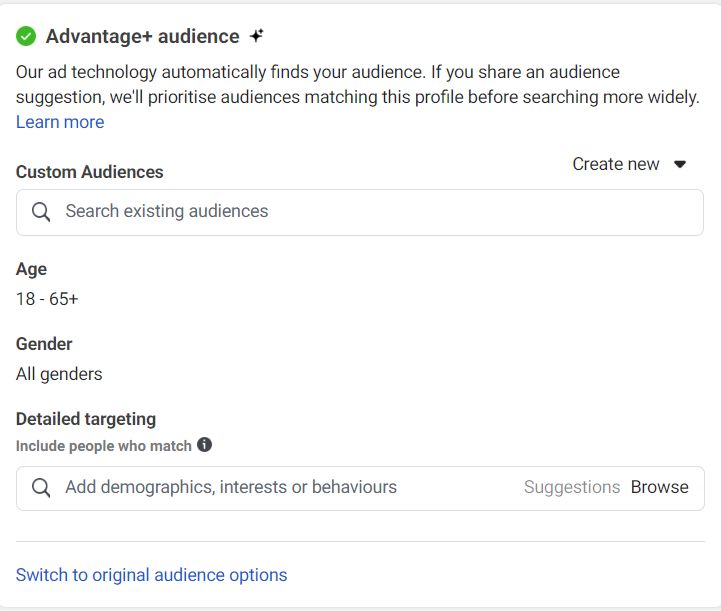Using Facebook Ads to their full potential has become a crucial digital marketing tactic for companies looking to increase their online visibility. Broad targeting is effective for certain businesses while interest targeting is effective for some.
While Facebook Interest targeting focuses on individual behaviour, interests and demographics, broad targeting aims to reach a large group of people. It is essential to understand the slight distinctions between these two strategies to maximise ROI and optimise advertising efforts.
Comparing Facebook Ads’ broad and interest-based targeting, we examine which approach is best in the ever-changing world of digital advertising.
What is Broad and Interest Targeting?
Advertisers can broaden their reach and enhance the exposure of their ads across a diverse range of individuals by selecting the Broad targeting option in the Facebook Ads Manager. This strategy intends to reach a significant amount of potential consumers to maximise exposure and create brand recognition.
On Facebook Ads, broad targeting is carried out based on age, gender, location and sometimes wider interests. Broad targeting can provide a greater reach than more focused methods, but it may also result in less relevance and engagement.
In Facebook ads, one can target individuals with ads that are specific to their interests, actions, and behaviours by using interest targeting. One can choose specific interests related to their target audience, such as hobbies, brands, activities, or topics they engage with.
Facebook interest targeting enables a more targeted approach, focusing on those who are likely to be interested in the products or services.
How does Broad work?
Advertisers may choose broad targeting in the Facebook Ads Manager by choosing broad demographics like age, gender, location, and so on without becoming detailed. The impact of wide targeting can differ greatly based on several factors including the campaign’s primary objectives, the industry, and the type of ad content.
Advertisers frequently need to regularly evaluate and optimize their campaigns to achieve better results from broad targeting. This involves making changes to targeting, ad creatives, and content to better connect with the varying groups. Advertisers may improve the effectiveness of their commercials and get better results over time by gathering information and refining their strategy. This also depends on learning at a large enough volume. To achieve that volume, a larger spending could be needed.
Pros:
- Conversions
- click-through rates,
- Increased in ROI
- Increased brand awareness
- Simplified set up
- Lower costs per impression
How does Interest targeting work?
Selecting specific interests, behaviours, or preferences that match the traits of the target audience is known as interest-based targeting in Facebook ads. We may target users via the Facebook Ads Manager based on persons, brands, activities, and behaviour, among other things.
Because interest-based targeting enables marketers to target a more relevant and engaged audience, it may have a major effect. Marketers must carry out in-depth research to find relevant interests and behaviours.
To optimize campaign performance, this may entail examining audience data, researching competitors, and experimenting with various targeting strategies. Advertisers should also continuously review and assess the outcomes of their advertising efforts, modifying their targeting specifications, among other things.

Conclusion
Facebook Ads are a must for improving your online presence. Broad targeting targets a large audience, whereas Interest targeting concentrates on the unique interests and behaviours of each individual. Comprehending these tactics is essential to optimise return on investment and advertising performance. Wider demographics, such as age and geography, are included in broad targeting, which has a large reach but may be less relevant.
To reach a more engaged audience, interest targeting focuses on particular interests and behaviours. For improved results, advertisers should continually optimize their efforts, which might require a large spending amount.. By matching the interests and behaviours of the target audience, interest targeting provides accuracy; yet, for the best campaign results, thorough research and constant optimization are needed.
